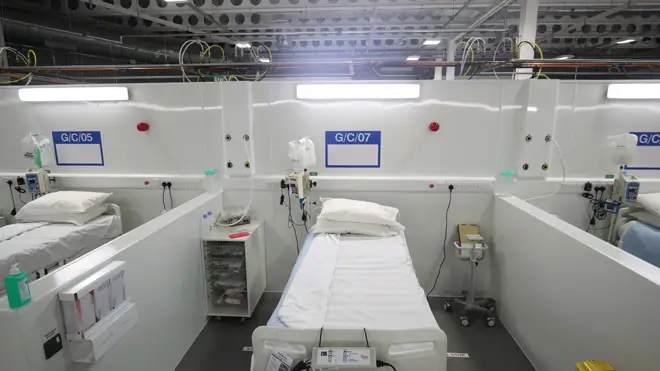
Nick Abbot 10pm - 1am
15 October 2020, 07:34 | Updated: 16 November 2020, 19:22

Health researchers have warned of the 'debilitating' effects of long covid which could actually be four different syndromes.
Academics have warned that long Covid could actually be four different syndromes.
They have been categorised as: post intensive care syndrome, post viral fatigue syndrome, permanent organ damage and long term Covid syndrome. Some patients may suffer them simultaneously.
Some have reported symptoms as long as seven months after infection and those who had a mild illness at the start can have worse ongoing symptoms than patients who needed intensive care treatment.
Even children can suffer, researchers said.
Read more: Consultants paid £7,000 a day to work on test and trace
Read more: London 'likely' to enter tier two this week

Hancock: NHS will have 40 'long-Covid' centres in place by end of month
Meanwhile, some people are living with a "rollercoaster of symptoms" that "move around the body".
Researchers from the National Institute for Health Research who reviewed the available evidence said ongoing Covid symptoms examined reports from people of all ages and backgrounds.
They said that it cannot be assumed that people who are at lower risk of severe illness and death from Covid-19 are also at low risk of ongoing Covid.

Long Covid: Perfectly healthy cyclist now in wheelchair
Academics said that more work is needed to help those who are suffering as they said that many are "not believed" when they seek help.
Ongoing symptoms can include breathlessness, chronic fatigue, "brain fog", anxiety and stress.
Meanwhile, others may have suffered permanent organ damage.
Some have reported "floating" symptoms whereby they suffer an illness linked to one part of the body - such as the respiratory system, the brain, cardiovascular system and heart, the kidneys, the gut, the liver or skin - which later abates only for new symptoms to arise in a different part of the body.
Such a wide range of symptoms, and different presentations of illness, mean that it is hard for doctors to diagnose, which means that it is equally difficult for patients to access the appropriate care, they added.
They also said that they did not like the term "long Covid" because it may mean that some patients who are struggling with ongoing after-effects are being missed.
Researchers called for anyone who believes they are suffering long-term after-effects to be logged as such in their NHS records, and the health service should adopt an approach of a "working diagnosis" to help those in need.
Academics stressed that the understanding of the effects are still at an early stage as they called on people living with the after-effects to get involved with research.
Dr Elaine Maxwell, review author, said: "We know from a number of surveys both in the UK and across the world, that a significant number of people experience ongoing effects after a Covid-19 infection.
"The list of symptoms is huge and covers every part of the body and brain.
"We heard from people who are still unable to work, study or care for dependents several months after their initial infection.
"We believe that the term 'long Covid' is being used as a capsule for more than one syndrome, possibly up to four.
"And we believe that the lack of distinction between these syndromes may explain the challenges people are having in being believed and accessing services.
"Some people experience classic post critical illness symptoms, others experience fatigue and brain fog in a way that's consistent with post viral fatigue syndrome.
"Some people have clear evidence of permanent organ damage caused by the virus, particularly lung damage and heart damage.
"But a significant group have debilitating symptoms that do not fit any of those three categories. They describe the rollercoaster of symptoms that move around the body."
She added that for some people there are "real" psychological and mental health issues including anxiety and depression.
Understanding the differences between the syndromes is vital for helping patients recover, she added.
She said the gaps in knowledge about the ongoing effects need to be ungently filled so people can get the best support.
"There is likely to be a rise in the number of people with long Covid in coming months," she added.
"People without a clear diagnosis told us they're often not believed by health services.
"Those who have been diagnosed and not always recognised in other parts of the service.
"We were told as recently as last week, as someone who has been diagnosed by their GP as having long Covid, who's now in month seven (of illness), called an ambulance because a new symptom and fainting and dizziness, and was told by the ambulance crews that it was caused by a panic attack."
She added that some people with a mild infection may have worse ongoing symptoms that those most critically ill.
"There are people who never had any support in hospital, never had a test, have no record of ever having had Covid, except their own personal history. They may be suffering far more than somebody who's ventilated for 21 days," said Dr Maxwell.
And some people who were in intensive care have no ongoing symptoms, she added.
Dr Maxwell continued: "The reason we don't like the term (long Covid) is because we think it's too vague.
"We recognise long haul is an American term, long Covid tends to be the British.
"And the thing that everybody has in common is that they are experiencing debilitating systems over a long period of time.
"But our point is there are subdivisions within that. And if you just use one overarching term you miss the distinctions, and that has implications both for research but also for advice that people are given."
Health officials have estimated that 60,000 people could be suffering with long-term after effects of Covid-19.